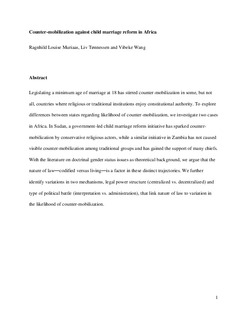Counter-mobilization against child marriage reform in Africa
Journal article, Peer reviewed
Date
2018-10-01Metadata
Show full item recordCollections
- Publications [1488]
Original version
in Political Studies, first published online: December 1, 2017 vol. 66 no. 4 pp. 851-868 10.1177/003232171774285910.1177/0032321717742859
10.1177/0032321717742859
Abstract
Legislating a minimum age of marriage at 18 has stirred counter-mobilization in some, but not all, countries where religious or traditional institutions enjoy constitutional authority. To explore differences between states regarding likelihood of counter-mobilization, we investigate two cases in Africa. In Sudan, a government-led child marriage reform initiative has sparked counter-mobilization by conservative religious actors, while a similar initiative in Zambia has not caused visible counter-mobilization among traditional groups and has gained the support of many chiefs. With the literature on doctrinal gender status issues as theoretical background, we argue that the nature of law-codified versus living-is a factor in these distinct trajectories. We further identify variations in two mechanisms, legal power structure (centralized vs decentralized) and type of political battle (interpretation vs administration), that link nature of law to variation in the likelihood of counter-mobilization.
A preprint of the article can be downloaded as a PDF file above
Series
Political StudiesPolitical Studies, first published online: December 1, 2017 vol. 66 no. 4
Political Studies, first published online: December 1, 2017 vol. 66 no. 4
Political Studies vol. 66 no. 4
